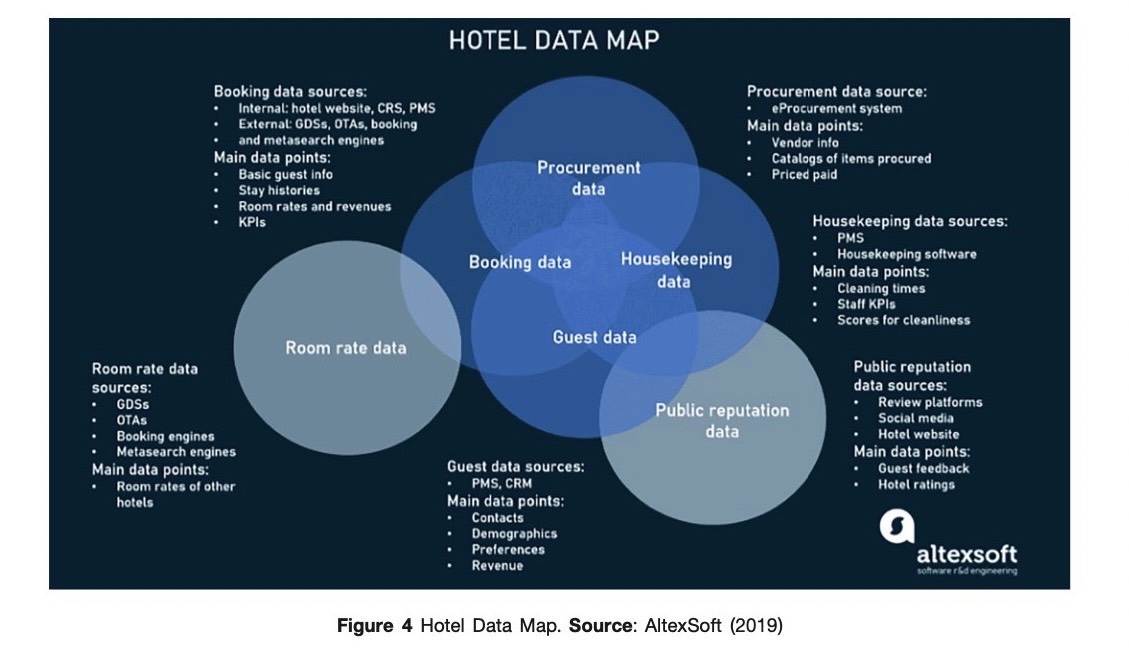Boutique Hotel Service Digitalization: A Business Owner Study
Main Article Content
Abstract
The COVID-19 pandemic has generated negative, economic impacts on the tourism and leisure sector in Thailand, especially small boutique hotels. These hotels have had to develop more efficient and innovative approaches to meet new normal expectations, for example, contactless service. Digital technologies, such as Machine Learning and Artificial Intelligence, can open new possibilities and opportunities for hotels to digitize their customers’ services. A review of the literature indicated that data important to the management of hotel products and services include Customer Segmentation, Customer Profiling, Menu Engineering, Productivity Indexing, Customer Associations, Forecasting, Energy Consumption, and Room Rates. These characteristics can be examined by machine learning. This study used a mixed qualitative and quantitative research method. The data were gathered by interviewing two boutique hotel owners in Bangkok and collecting the hotels’ data, including online travel booking agents and direct booking logs, for the period April 2016 – September 2021. The analysis was conducted using the booking data from the two hotels: 3946 records from Hotel A and 3948 from Hotel B. In this research, k-means clustering was used to segment hotel guests. Two-class logistic regression and a two-class boosted decision tree were used to predict the prospective customer, while linear regression and decision forest regression were used to forecast the market demand. The findings reveal a model of hotel business owners’ requirements to innovate new service solutions, such as the contactless software solution, that guests can employ for check-in, check-out, order services, and talk to the hotel through the mobile application. This would help hotel owners to manage costs, employees, and customers. The solution also means that hotel managers would no longer need to be involved in the manual implementation of revenue management tasks. This data analytics approach can effectively sift through the signals detected from market variables, discover patterns and anomalies, make predictions for guest arrivals, and calculate optimum prices in real-time, as the market changes.
Downloads
Article Details

This work is licensed under a Creative Commons Attribution-NonCommercial-NoDerivatives 4.0 International License.
All material is licensed under the terms of the Creative Commons Attribution 4.0 International (CC-BY-NC-ND 4.0) License, unless otherwise stated. As such, authors are free to share, copy, and redistribute the material in any medium or format. The authors must give appropriate credit, provide a link to the license, and indicate if changes were made. The authors may do so in any reasonable manner, but not in any way that suggests the licensor endorses you or your use. The authors may not use the material for commercial purposes. If the authors remix, transform, or build upon the material, they may not distribute the modified material, unless permission is obtained from JARS. Final, accepted versions of the paper may be posted on third party repositories, provided appropriate acknowledgement to the original source is clearly noted.
References
AltexSoft. (2019). Hotel data management: Solutions and practices to turn information into a valuable asset.Retrieved January 15, 2022, from https://www.altexsoft.com/blog/hotel-data-management-best-practices
Barga, S. R., Fontama, V., & Tok, W.-H. (2015). Predictive analytics with microsoft machine learning: Build and deploy actionable solutions in minutes. Apress.
Berns, J. (2015). Azure machine learning. Microsoft Press.
Buhalis, D., & Foerste, M. (2015). SoCoMo marketing for travel and tourism: Empowering co-creation of value. Journal of Destination Marketing & Management, 4(3), 151–161. https://doi.org/10.1016/j.jdmm.2015.04.001
De Pelamacker, P., van Tilburg, S., & Holthof, C. (2018). Digital marketing strategies, online reviews and hotel performance. International Journal of Hospitality Management, 72, 47–55. https://doi.org/10.1016/j.ijhm.2018.01.003
Dragosavac, G. (n.d.). Big data analytics : Analytics in hotel industry. Retrieved January 30, 2022, from http://www.bigdatanalysis.com/big-data-analytics-in-hotel-industry
Dube, K., Nhamo, G., & Chikodzi, D. (2020). COVID-19 cripples global restaurant and hospitality industry. Current Issues in Tourism, 24(11), 1487-1490. https://doi.org/10.1080/13683500.2020.1773416
Ganaban, R. (2022). Use next-gen tech for a contactless guest experience. HotelTechReport. Retrieved February, 28, 2022 from https://hoteltechreport.com/news/next-gen-tech-contactless-guest-experience
Gossling, S., Scott, D., & Hall, C. M. (2020). Pandemics, tourism and global change: A rapid assessment of COVID-19. Journal of Sustainable Tourism, 29(1), 1-20. https://doi.org/10.1080/09669582.2020.1758708
Gilley, S. (2022). Azure Machine Learning documentation. Microsoft Corporation. Retrieved April 30, 2022, from https://docs.microsoft.com/en-us/azure/machine-learning
Infosys. (2018). Role of AI in travel and hospitality industry. Retrieved March 15, 2022, from https://www.infosys.com/industries/travel-hospitality/documents/ai-travel-hospitality.pdf
Ismail, N. (2016). Machine learning and AI technology in the hospitality industry. Information Age. Retrieved March 30, 2022, from https://www.information-age.com/machine-learning-hospitality-2982
Kidd, C., & Hornay. R. (2021). Data analytics vs data analysis: What’s the difference?. BMC. Retrieved February 15, 2022, from https://www.bmc.com/blogs/data-analytics-vs-data-analysis
Law, R., Buhalis, D., & Cobanoglu, C. (2014). Progress on information and communication technologies in hospitality and tourism. International Journal of Contemporary Hospitality Management, 25(5), 727-750. https://doi.org/10.1108/IJCHM-08-2013-0367
Lunkam, P. (2021). Nǣo nōm thurakit / ʻutsāhakam pī 2564-2566 : thurakit rōngrǣm [Industry Outlook 2021-2023: Hotel Industry]. Krungsri Research. Retrieved April 15, 2022, from https://www.krungsri.com/th/research/industry/industry-outlook/services/hotels/io/io-hotel-21
Nicola, M., Alsafi, Z., Sohrabi, C., Kerwan, A., Al-Jabir, A., Iosifidis, C., Agha, M., & Agha, R. (2020). The socio-economic implications of the coronavirus and COVID-19 pandemic: a review. International Journal of Surgery, 78, 185–193. https://doi.org/10.1016/j.ijsu.2020.04.018
Noone, B. M., McGuire, K. A., Rohlfs, K. V. (2011). Social media meets hotel revenue management: Opportunities, issues and unanswered questions. Journal of Revenue and Pricing Management, 10, 293–305.
Quanovo Data Technologies. (2017). Machine learning technologies for the hospitality industry. Retrieved May 15, 2022, from https://www.quanovo.com/Content/Whitepapers/machine-learning-technologies-for-the-hospitality-industry.pdf
Rob L., Dimitrios B., Cihan C. (2014). Progress on information and communication technologies in hospitality and tourism. International Journal of Contemporary Hospitality Management. 26(5) 727-750, 2014.
Solnet, D., Subramony, M., Ford, R. C., Golubovskaya, M., Kang, H. J., & Hancer, M. (2019). Leveraging human touch in service interactions: Lessons from hospitality. Journal of Service Management, 30(3), 392-409. https://doi.org/10.1108/JOSM-12-2018-0380
Wen, J., Kozak, M., Yang, S., & Liu, F. (2021). COVID-19: Potential effects on Chinese citizens’ lifestyle and travel. Tourism Review, 76(1), 74-87. https://doi.org/10.1108/TR-03-2020-0110
Yi, R. (2019). Research on development status and trend of unmanned wisdom hotel system based on artificial intelligence service -take Bangwei Company as an example. Finance and Market, 4(1) 36-43.


